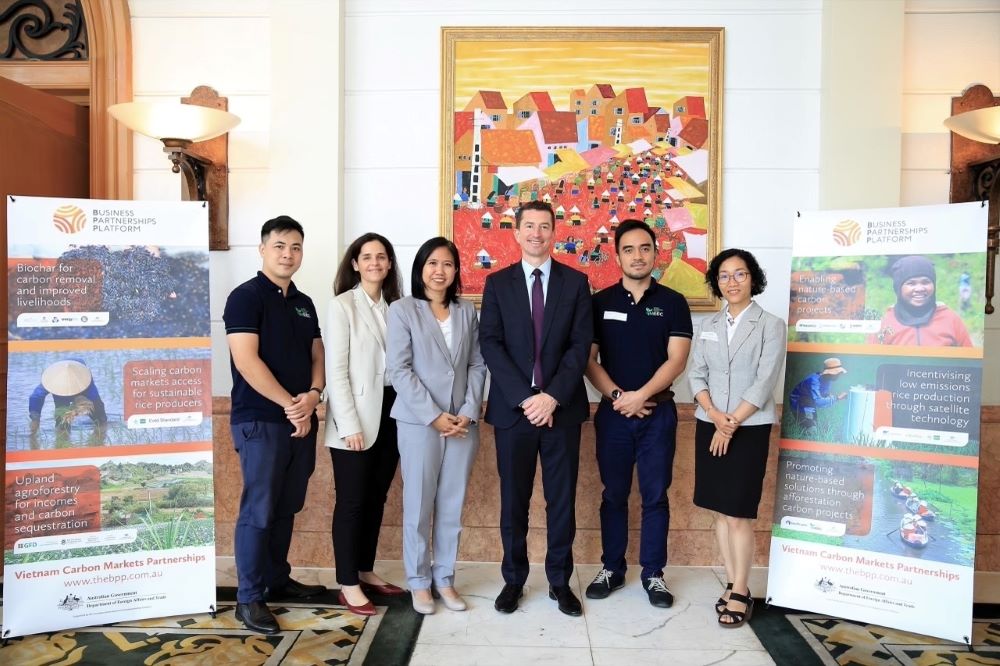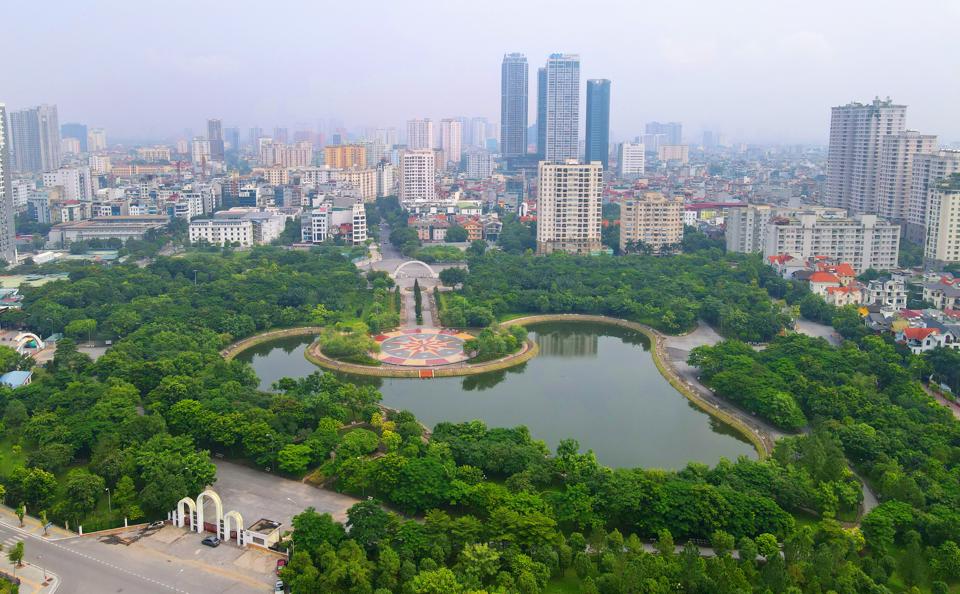Australia supports carbon markets partnerships in Vietnam
The support from the private sector is expected to support Vietnam’s climate action and inclusive economic growth.
The Australian Department of Foreign Affairs and Trade (DFAT) has announced six new private sector partnerships worth US$3.7 million for carbon markets projects in Vietnam that are able to deliver verifiable and sustainable social and environmental outcomes.
Chargé d’Affairs Mark Tattersall (3rd right) and Partner from Promoting nature-based solutions through afforestation carbon projects. Photo: Embassy of Australia in Hanoi |
Multistakeholder partnerships funded under DFAT’s Business Partnerships Platform (BPP) will promote the growth of sustainable carbon markets in communities in Vietnam.
The new partnerships will test and trial new approaches within voluntary market frameworks to reduce greenhouse gas emissions, lower carbon market entry barriers for producers, build the capacity of local stakeholders and deliver important social benefits.
“Australia is ambitious for what we can achieve together with Vietnam, and the region, in confronting the challenges of climate change,” said Chargé d’Affairs, Mark Tattersall.
He said these new BPP Carbon Markets partnerships are part of Australia’s commitment to supporting enhanced climate action in our region, including through climate partnerships that also work to deliver social and environmental benefits to communities.
The six partnerships include:
Incentivising low emissions rice production through satellite technology – A partnership with CarbonFarm Technology, the International Rice Research Institute, Rikolto and DFAT to train and support rice producers to move to lower emission practices. The partnership will also pilot a world-first satellite-driven Measuring, Reporting and Verification solution for rice. The satellite MRV will leverage advances in remote-sensing technology to detect sustainable practices and accurately estimate emissions reductions from satellite images. International Rice Research Institute is providing scientific advisory and on-the-ground data control support to ensure the project achieves the desired emissions reductions.
Scaling carbon markets access for sustainable rice producers – A partnership between the International Rice Research Institute – Vietnam, Gold Standard and DFAT to develop a new methodology for generating carbon credits from rice production. The initiative aims to create a digital platform that simplifies the process of registering and assessing mitigation projects under the new methodology, and deliver training and capacity-building tools to guide widespread use of the methodology and platform and enable smallholder rice producers to engage in carbon markets.
Enabling nature-based carbon projects – A partnership with NatureCo, One Tree Planted, the Centre for Nature Conservation and Development, Cooper Energy and DFAT to identify opportunities for Nature-Based Solutions (NbS) across Vietnam, work with local organizations to build carbon skills and develop a NbS pilot project focused on carbon mitigation through reforestation. Learnings gained will be used to develop a toolkit and lay the foundations for future growth and private sector investment in NbS in Vietnam.
Upland crop planting for incomes and carbon sequestration – A partnership with Greenfield Consulting and Development, the University of Queensland, the Forest Science Centre of Northwest Vietnam and DFAT to generate carbon credits by planting timber and multi-purpose (fruit and timber) trees on sloping cropland in Son La province, Vietnam. The project aims to plant 100,000 trees and generate at least 300,000 tonnes of carbon abatement for carbon credits – improving local livelihoods and the environment.
Biochar for carbon removal and improved livelihoods – A partnership with Biocare Projects, EnergyLink Services, the University of Adelaide, Ho Chi Minh City University of Technology, Mai Anh Dong Thap and DFAT to establish biochar production in the Mekong Delta. The project aims to remove approximately 15,000 tonnes of CO2e annually, creating new income streams for local communities through carbon credits and the purchase of biomass feedstock.
Promoting nature-based solutions through afforestation carbon projects – A partnership with South Pole, Energy and Environment Consultancy (VNEEC) and DFAT to Nature-based Solutions carbon projects in Vietnam and support the enabling environment for Jurisdictional and Nested REDD+ projects, using existing afforestation projects in Northwest Vietnam as a model. The partnership will work to strengthen individual and institutional capacity to implement carbon projects, through on-the-ground assistance, training and technical support – building a sustainable pathway for future forest management and carbon projects.
The Business Partnerships Platform supports partnerships between DFAT and inclusive, commercially sustainable businesses to deliver strategic development outcomes, with a focus on gender equality, social inclusion and climate impact. Since 2016, the program has supported 52 partnerships in 18 countries.
| Hanoi makes efforts to increase green space. Photo: Pham Hung/The Hanoi Times |
To boost economic growth and inclusive prosperity, Hanoi has joined the efforts by its own contributions, including the recent signing of a memorandum of understanding (MoU) with the International Finance Corporation (IFC), a sister organization of the World Bank Group, to attract high value-added investment and diversify its funding sources. The move enables the capital city to sustain its rapid economic development, competitiveness, and inclusive prosperity. One of the fastest-growing cities in Asia, the country’s capital accounts for one-fifth of Vietnam’s gross domestic product (GDP). With a population of over eight million, Hanoi garnered the most foreign direct investment ($8.45 billion) in 2019 out of all the 63 cities and provinces in the nation. Hanoi seeks to draw higher-quality FDI streams in order to maintain vigorous socioeconomic development. The development of high-tech and high value-added industries, increased local sourcing, and the creation of more and better jobs will all be aided by this. Under the MoU framework, IFC will work with Hanoi to formulate a new-generation FDI strategy in response to the government’s master plan of foreign investment promotion toward 2030. |













